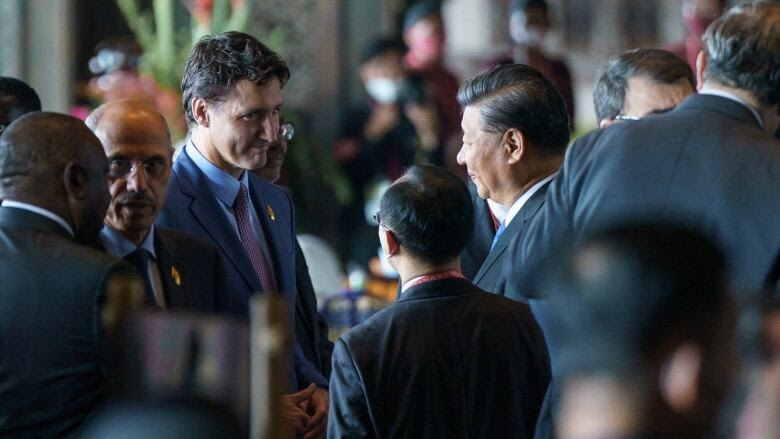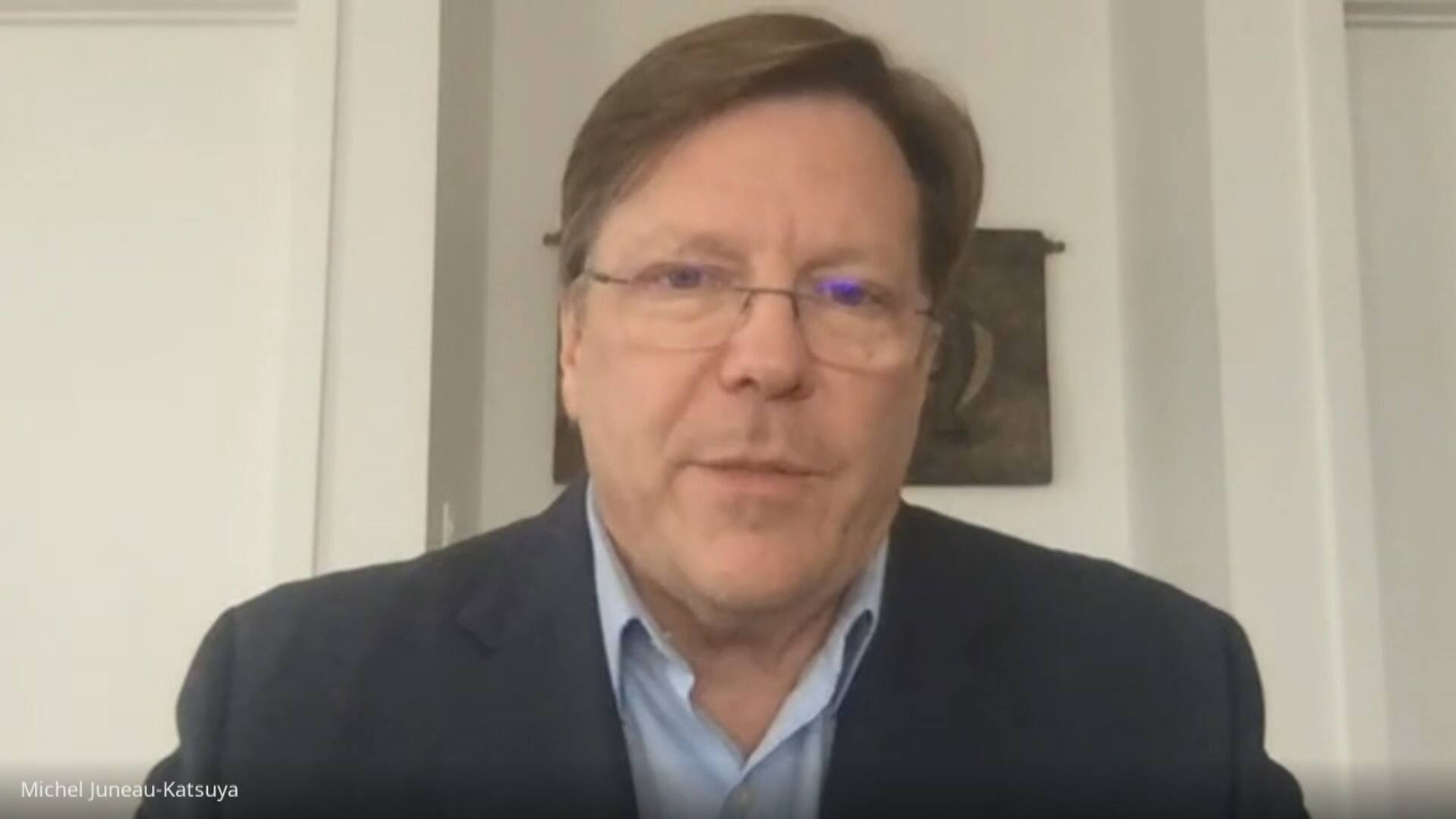Chinese police stations indication of wider ‘bullying, intimidation’ tactics, experts say
A counter-intelligence expert says CSIS has known about foreign interference from China for decades

Christina (Hwa Song) Jung · CBC News · Posted: Dec 20, 2022 5:00 AM PT | Last Updated: December 20, 2022

Prime Minister Justin Trudeau says he raised the issue of interference with Chinese President Xi Jinping at last month’s G20 summit in Indonesia. (Prime Minister’s Office)
As allegations of five Chinese police stations located in Canada, including one in Vancouver, B.C., raise concerns of political interference, experts say the role of Chinese intelligence is far more widespread.
Earlier this month, a friendship society in Richmond was visited by RCMP officers after the Spanish human rights groups Safeguard Defenders published a report alleging that Chinese “police service stations” were operating in Canada, including one in Vancouver.
The group alleges the stations are operated out of four jurisdictions in China and are involved in “persuasion to return” operations, where nationals suspected of committing crimes are asked to return to China to face criminal proceedings.
“Former state functionaries that have been accused of bribery or corruption after a changing of the guards … have been telling us about these stations and undercover police officers from China as early as 2017,” Warda Shazadi Meighen, an immigration and refugee lawyer, told CBC News.
- China operating ‘police’ station out of Vancouver, civil rights group alleges
- RCMP investigating Chinese ‘police’ stations in Canada
The Chinese Embassy has previously described the offices as volunteer-run service stations to process things like driver’s licences, which Meighen says is “a little bit suspicious” as passport and licence renewals are typically performed by embassies and consulates aboard.
“I’m aware of human rights defenders or dissidents or Fallon Gong practitioners [being] targeted through these security offices,” she said.
“Sometimes they’ll get messages on WeChat, which is a Chinese version of WhatsApp … to come to a certain location or they’ll start being followed by people.”
Criminal code law needed
Michel Juneau-Katsuya, a former senior intelligence expert and chief of Asia Pacific for CSIS, says more government intervention and foreign laws are needed to stop these types of foreign interference or intimidation techniques, which he says have been going on for a long time.
“We have been monitoring our foreign interference from the Chinese government for decades,” Katsuya said, adding that these stations are a symbol of much wider activities.
“But the problem we are currently facing is that … we don’t have the tools. What the criminal [and civil] codes offer currently are things like arrest [and] defamation, but it’s not enough.”
WATCH | Counter-intelligence expert explains how information is gathered by Chinese agencies:

Former senior intelligence officer provides explanation on how information is gathered by the Chinese government.
22 days agoDuration 0:47Michel Juneau-Katsuya, the former chief of Asia Pacific for CSIS says there’s a difference between how government officials in the West and China gather information.
He claims the alleged service stations are set up to control the Chinese Canadian community through “bullying and intimidation.”
“Basically, what we are talking about is literally having agents of influence bring messages, intimidate people, directly follow people, take pictures or spread rumours on their social media.”
Yiping Li said he moved to Vancouver as a refugee from Hong Kong in 1997 and believes he was a target of the Chinese government for his campaigns and social media messages advocating for minority rights in China.
“I got threats all the time from online and from my social media. They published my home address, my phone number and my mom’s phone number and asked everybody to phone me.”
Li says he believes he’s still being targeted by the Chinese government. (Submitted by Yiping Li)
Li lived in Vancouver for 20 years before moving out east, he said, but still experiences people following him or watching him.
“Just a month ago … I saw a guy parked in his SUV outside my house taking pictures.”
wHAT
Chinese police stations indication of wider ‘bullying, intimidation’ tactics, experts say
A counter-intelligence expert says CSIS has known about foreign interference from China for decades

Christina (Hwa Song) Jung · CBC News · Posted: Dec 20, 2022 5:00 AM PT | Last Updated: December 20, 2022

Prime Minister Justin Trudeau says he raised the issue of interference with Chinese President Xi Jinping at last month’s G20 summit in Indonesia. (Prime Minister’s Office)
As allegations of five Chinese police stations located in Canada, including one in Vancouver, B.C., raise concerns of political interference, experts say the role of Chinese intelligence is far more widespread.
Earlier this month, a friendship society in Richmond was visited by RCMP officers after the Spanish human rights groups Safeguard Defenders published a report alleging that Chinese “police service stations” were operating in Canada, including one in Vancouver.
The group alleges the stations are operated out of four jurisdictions in China and are involved in “persuasion to return” operations, where nationals suspected of committing crimes are asked to return to China to face criminal proceedings.
“Former state functionaries that have been accused of bribery or corruption after a changing of the guards … have been telling us about these stations and undercover police officers from China as early as 2017,” Warda Shazadi Meighen, an immigration and refugee lawyer, told CBC News.
- China operating ‘police’ station out of Vancouver, civil rights group alleges
- RCMP investigating Chinese ‘police’ stations in Canada
The Chinese Embassy has previously described the offices as volunteer-run service stations to process things like driver’s licences, which Meighen says is “a little bit suspicious” as passport and licence renewals are typically performed by embassies and consulates aboard.
“I’m aware of human rights defenders or dissidents or Fallon Gong practitioners [being] targeted through these security offices,” she said.
“Sometimes they’ll get messages on WeChat, which is a Chinese version of WhatsApp … to come to a certain location or they’ll start being followed by people.”
Criminal code law needed
Michel Juneau-Katsuya, a former senior intelligence expert and chief of Asia Pacific for CSIS, says more government intervention and foreign laws are needed to stop these types of foreign interference or intimidation techniques, which he says have been going on for a long time.
“We have been monitoring our foreign interference from the Chinese government for decades,” Katsuya said, adding that these stations are a symbol of much wider activities.
“But the problem we are currently facing is that … we don’t have the tools. What the criminal [and civil] codes offer currently are things like arrest [and] defamation, but it’s not enough.”
WATCH | Counter-intelligence expert explains how information is gathered by Chinese agencies:

Former senior intelligence officer provides explanation on how information is gathered by the Chinese government.
22 days agoDuration 0:47Michel Juneau-Katsuya, the former chief of Asia Pacific for CSIS says there’s a difference between how government officials in the West and China gather information.
He claims the alleged service stations are set up to control the Chinese Canadian community through “bullying and intimidation.”
“Basically, what we are talking about is literally having agents of influence bring messages, intimidate people, directly follow people, take pictures or spread rumours on their social media.”
Yiping Li said he moved to Vancouver as a refugee from Hong Kong in 1997 and believes he was a target of the Chinese government for his campaigns and social media messages advocating for minority rights in China.
“I got threats all the time from online and from my social media. They published my home address, my phone number and my mom’s phone number and asked everybody to phone me.”
Li says he believes he’s still being targeted by the Chinese government. (Submitted by Yiping Li)
Li lived in Vancouver for 20 years before moving out east, he said, but still experiences people following him or watching him.
“Just a month ago … I saw a guy parked in his SUV outside my house taking pictures.”
